 Petzlover
Petzlover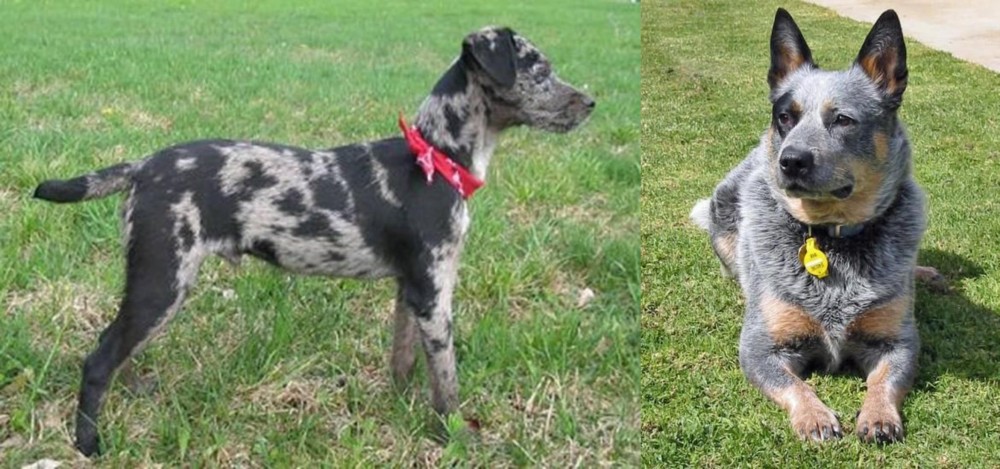 Atlas Terrier is originated from United States but Queensland Heeler is originated from Australia. Atlas Terrier may grow 23 cm / 9 inches shorter than Queensland Heeler. Atlas Terrier may weigh 16 kg / 35 pounds lesser than Queensland Heeler. Both Atlas Terrier and Queensland Heeler has almost same life span. Atlas Terrier may have more litter size than Queensland Heeler. Atlas Terrier requires Moderate Maintenance. But Queensland Heeler requires Low Maintenance
Atlas Terrier is originated from United States but Queensland Heeler is originated from Australia. Atlas Terrier may grow 23 cm / 9 inches shorter than Queensland Heeler. Atlas Terrier may weigh 16 kg / 35 pounds lesser than Queensland Heeler. Both Atlas Terrier and Queensland Heeler has almost same life span. Atlas Terrier may have more litter size than Queensland Heeler. Atlas Terrier requires Moderate Maintenance. But Queensland Heeler requires Low Maintenance
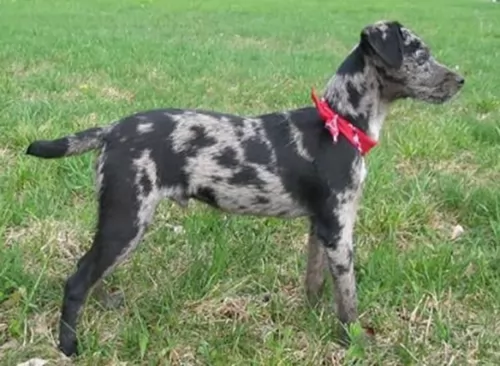 The Atlas Terrier is a rare dog. He was developed in the USA and is a blend of Jack Russell Terriers, Rat Terriers, Border Terriers and Patterdale Terriers. It was in 1990 that Lauren Wolfe developed a breed similar to the Jack Russell, but with a solid colour, and in fact she had two dogs that were solid red in colour. This was as a result of a cross between a Jack Russell Terrier and a Border Terrier.
The Atlas Terrier is a rare dog. He was developed in the USA and is a blend of Jack Russell Terriers, Rat Terriers, Border Terriers and Patterdale Terriers. It was in 1990 that Lauren Wolfe developed a breed similar to the Jack Russell, but with a solid colour, and in fact she had two dogs that were solid red in colour. This was as a result of a cross between a Jack Russell Terrier and a Border Terrier.
With the crossing of different terriers, the foundation for the Atlas Terrier was formed. Lauren Wolfe named the breed ‘Atlas Terrier’ because many terriers from various parts of the world were used to develop this specific breed. It was in 2001 that the Atlas Terrier Association was founded.
 Another name for Queensland Heeler is Australian Cattle Dog or Blue Heeler.
Another name for Queensland Heeler is Australian Cattle Dog or Blue Heeler.
These dogs have always been known for herding cattle. The term ‘Heeler’ comes from the dog’s working style – nipping and biting at the cattle’s hooves.
He was was an Australian cattle dog for Australian settlers in the 1800s. It is believed that Thomas Hall created one of the foundations of the Australian Cattle Dog breed by crossing crossing sheepdogs with Dingos.
The Blue-colored dogs have been the most popular, being known as the Blue Heeler.
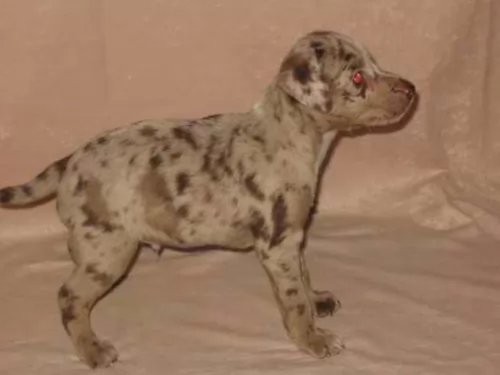 Atlas Terrier dogs are a small to medium sized dog but with a strong personality. With their two coat varieties – smooth and wire – and coming directly from the Jack Russell Terrier, this feisty dog suits those who want a low maintenance, fun breed who will join them on their walks or jogs. These dogs are brave and loyal and will double as a watch dog and family pet.The breed is accepted for registry and it is classified under the Terrier dog category.
Atlas Terrier dogs are a small to medium sized dog but with a strong personality. With their two coat varieties – smooth and wire – and coming directly from the Jack Russell Terrier, this feisty dog suits those who want a low maintenance, fun breed who will join them on their walks or jogs. These dogs are brave and loyal and will double as a watch dog and family pet.The breed is accepted for registry and it is classified under the Terrier dog category.
There are 3 sizes of Atlas Terrier – toy, miniature, and standard. The toy variety is 23 to 28 cm tall at the shoulder and weighs 2.7 to 5.4 kg. All three varieties are the same except for height and weight.
The coat of this dog is thick and may come in a variety of colours such as brindle or merle. The Atlas Terrier is also found in solid colours and sometimes you will find that they have white markings on the face, feet or chest. Most times the tail of the Atlas Terrier is docked, but if not, the tail curls over the back. The ears of the Atlas Terrier are V-shaped and they fold forward.
 The Queensland Heeler is a medium sized dog that stands between 43 and 51cm in height, both male and female. The dog weighs in the region of 15 to 22kg.
The Queensland Heeler is a medium sized dog that stands between 43 and 51cm in height, both male and female. The dog weighs in the region of 15 to 22kg.
He has a short double coat with colors being blue, mottled blue and also red speckled. You’ll also find black and tan coloring on this active dog.
He is strong, lean and muscular with medium sized ears that are erect. The eyes are dark and alert, the legs straight and strong. The tail can be docked or left long.
The Australian Cattle Dog is a high-energy working dog that you won’t easily find lying around. The alert eyes are consistently looking around for action and he can’t be bored otherwise he could resort to digging or other destructive behavior.
He is loving to his entire human family, but being particularly attached to just one family member. He is also protective, taking his guarding role of his family seriously.
He gets on well with children and other pets but you’ve just got to keep your eyes on him around children as when excited he can give a nip or two.
Training and socialization will be important for this dog, particularly because he can be strong-headed, willful and stubborn.
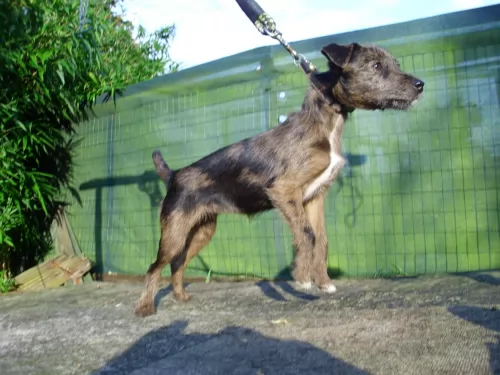 Atlas Terriers most certainly have a bit of the Jack Russell in them and these dogs are social, outgoing, mischievous and affectionate. They’re just like your regular naughty child and having one of them in your home will mean energy and lots of fun and games.
Atlas Terriers most certainly have a bit of the Jack Russell in them and these dogs are social, outgoing, mischievous and affectionate. They’re just like your regular naughty child and having one of them in your home will mean energy and lots of fun and games.
This is a highly social breed and he won’t like to be left alone every day. Just like a human child, he will need to be stimulated to ward off boredom and to prevent him from becoming destructive.
The Atlas Terrier just loves games and if you’re ready for a game, he will be more than ready to take part. He is intelligent and will therefore responds well to training and socialization. When properly socialized, Atlas Terriers get along well with children, and because they’re not an aggressive breed, if they’re properly trained and socialized they will get along with other pets too. Atlas Terriers make excellent pets, but he is a strong willed dog and will require an owner who is firm, but fair.
 Active, intelligent, feisty, brave, playful, loving – these are just some of the wonderful characteristics you get when you bring a Queensland Heeler into your home.
Active, intelligent, feisty, brave, playful, loving – these are just some of the wonderful characteristics you get when you bring a Queensland Heeler into your home.
True, he is independent, self-willed and stubborn, but training and socialization can take away all the rough edges.
He forms a strong bond with his human owner, and once you’ve had one of these amazing dogs in your life, you’ll be convinced that dogs are truly man’s best friend.
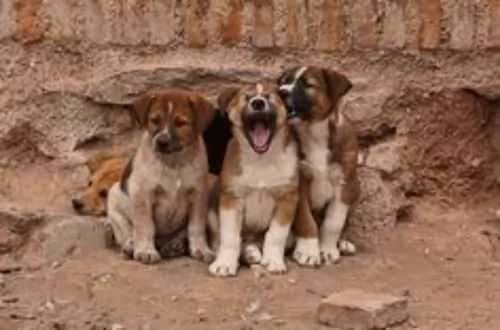 The selective breeding program of Atlas Terriers has meant that this is a robust, spunky breed free of any major health concerns. While they are a low maintenance breed with longevity on their side, you still have to be a responsible pet owner and see that your Atlas Terrier puppy gets all those must have injections.
The selective breeding program of Atlas Terriers has meant that this is a robust, spunky breed free of any major health concerns. While they are a low maintenance breed with longevity on their side, you still have to be a responsible pet owner and see that your Atlas Terrier puppy gets all those must have injections.
Tiny puppies are susceptible to infectious diseases and will have to be vaccinated against them from 8 weeks on and then also get an annual booster. The diseases to be vaccinated against include hepatitis, distemper, parvovirus, coronavirus, eptospirosis and parainfluenza. Vaccinations must be kept up to date and it is mandatory for your puppy to be vaccinated against rabies.
 Australian Cattle Dogs are healthy. Every dog, even the most healthiest breeds, can succumb to some of the common dog illnesses there are.
Australian Cattle Dogs are healthy. Every dog, even the most healthiest breeds, can succumb to some of the common dog illnesses there are.
This is an inherited condition, so if you’re looking for a puppy, be careful about the breeder you buy from.
This is another inherited condition where the thighbone of the dog doesn't fit properly into the hip joint. Your dog is usually so active but with this problem he may well be in pain and actually be lame. Your pet can even develop arthritis . The idea is to get your pet to the vet because it can be unbearable to see him in pain and unable to get around.
This eye disease can mean deterioration of the retina. You'll recognize the signs when you see your dog unable to navigate around your home during the night. He is night blind but later on he can’t see during the day either.
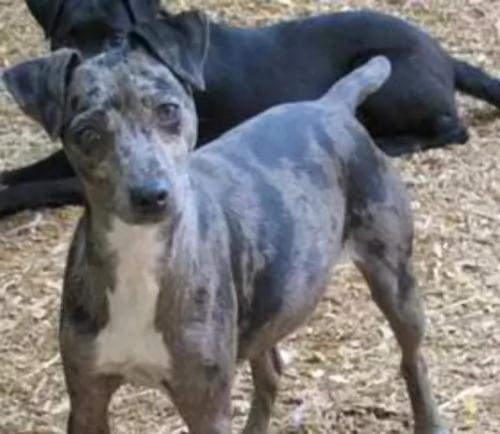 As a medium shedder, the Atlas Terrier will require some grooming. Grooming is easy and a brush twice a week with a rubber-bristled brush will remove those loose hairs and give his coat a sheen.
As a medium shedder, the Atlas Terrier will require some grooming. Grooming is easy and a brush twice a week with a rubber-bristled brush will remove those loose hairs and give his coat a sheen.
Always make sure you’re feeding your tiny puppy the right quantities of a food type. Always feed your puppy food which is appropriate to his age. Your 8 week old puppy will require 4 meals a day. A highly active breed such as the Atlas Terrier will require more protein for energy.
Speak to your veterinarian about the perfect diet for your puppy and about wet- or dry foods. There is the choice of feeding your puppy commercial dog food or your own home-prepared meals, but then you want to be sure that your puppy is getting the right balance of minerals and vitamins.
Once your Atlas Terrier is about a year of age, he can go onto one meal a day or a lighter meal in the morning and the evening. Remember to ensure that there is always clean, cool water available for your puppy.
 To cope with his life on the Australian Outback, the Queensland Heeler is known to be a low maintenance dog.
To cope with his life on the Australian Outback, the Queensland Heeler is known to be a low maintenance dog.
The thick coat does shed and it can get dusty so a good brush twice a week is all that is basically required for this dog. If his nails don’t wear down naturally, you will need to have them trimmed. As with every dog, you will need to give attention to his ears and teeth.
This is an extremely active dog. He is going to be needing both mental and physical stimulation to avoid boredom, after all he is used to an active lifestyle herding cattle. Hikes, swimming, running – you name it – he’ll join you with all your activities.
Your Queensland Heeler is such a vibrant dog, full of the joys of living, and you want to ensure he has good food to eat to ensure he stays like that.
For convenience you get some excellent commercially manufactured dog foods. Your Blue Heeler is such a wonderful companion dog that you want to spoil him a bit and give him some delicious home-made food too. Boiled chicken, brown rice or pasta and spinach, sweet potatoes and carrots are a healthy choice for your pet – plain and simple just like dogs love it. Chop it up and add it into the high quality dry kibble a couple of times a week.
Some raw meat added in from time to time will help his skin and coat remain healthy. Never leave him without a constant source of fresh, cool water.